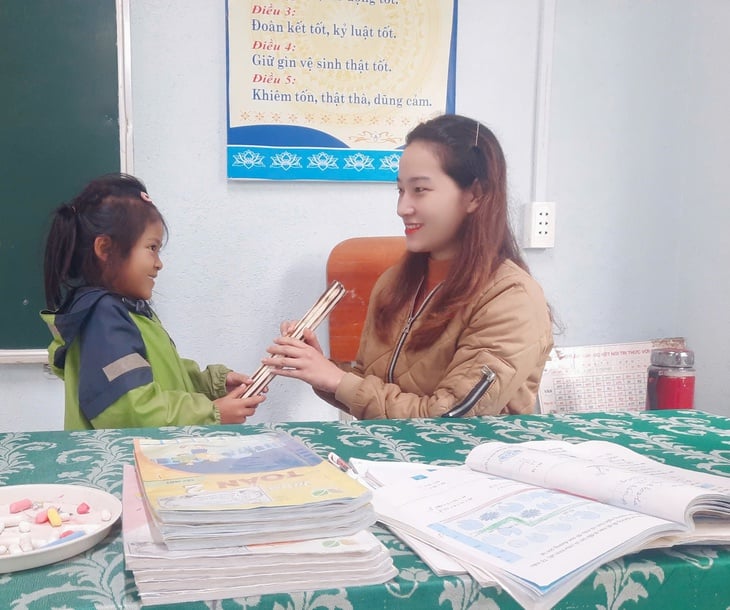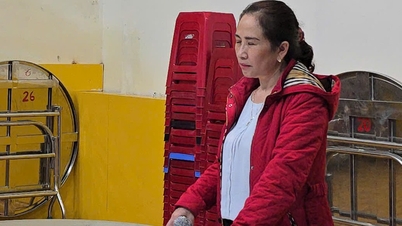
Students of Lang Luong school ( Da Nang city) brought bamboo tube rice to give to their teacher on the morning of November 20 - Photo: TRA THI THU
I came across a moment that made me stop for a long time: a teacher stood in front of the school gate, bent down to tie a student's shoelace, then softly said: "You're done, go to class."
Teachers and worries not on the timetable
That image makes me think of the ordinary, quiet things that are not included in any summary that many teachers maintain every day. But those actions are enough for us to understand more deeply the three words "cultivating people".
When we remember our teachers, what comes to mind are often not the lectures in textbooks, but the small moments like the image of the teacher and student I encountered above.
Those are the girls who quietly put the bag of cookies in the desk drawer when they knew we were in a hurry to go to school this morning; or the raincoat the teacher gave us and told us to "put it on or you'll catch a cold". Those are the afternoons when she stood at the classroom door and waited a few more minutes just to ask "Are you okay today?".
Those little things are not recorded in any reports, no one scores or rewards them, but they stay in the students' memories for a long time.
The recent story in Tuyen Quang made me realize that even more.
When a student intended to quit school to help his family, the teacher waded through streams, crossed mountain passes, and traveled more than 7km of forest to find the student’s house to encourage him to return to class. That quiet action is a testament to the dedication and perseverance of teachers in the highlands in particular, and of those who work in the profession of spreading knowledge in general.
Outsiders often look at the teaching profession through teaching schedules, lectures, and exam results.
But deep inside is a nameless part: teachers become the first to notice when a child changes - becomes quieter, more irritable, sits quietly in the back of the class, or suddenly misses classes for several days in a row.
When schools do not have psychologists, teachers become "emotional gatekeepers", the ones who listen to trembling confessions, the ones who block the seeds of depression, violence or negative thoughts that society cannot see.
In this silent role, teachers are under more pressure than we think.
Outside of class time, there are paperwork, activities, meetings, late-night messages from parents. Teachers worry about things that are not their responsibility: family problems, parents' divorce, bullying. Teachers bring home worries that are not on their timetable.
But rarely does anyone ask: "Who is taking care of teachers' mental health?".
More burden, but less understanding
We often think that teachers must meet all of parents' expectations: teaching well, training well, tutoring well, resolving conflicts, ensuring achievements. But when things don't go as planned, people ask "What does the school do?", "How do you teach?", but rarely ask: "What did you get from your teachers besides grades?".
That default makes teachers' roles heavier and heavier, while understanding decreases.
The quality of education cannot be good if teachers are exhausted. Teachers need to be relieved of administrative work so that they have time to observe, listen, talk and support.
Schools need psychologists to help ease the emotional burden teachers carry. Parents need to see teachers as companions, not service providers who must always be “pleased.”
Respect for the teaching profession is not in the bouquet of flowers on November 20, but in the way we talk about teachers to our children, in our calmness when resolving conflicts, in standing by them when they do the right thing.
One careless, thoughtless remark can erase years of a teacher's efforts.
The images of teachers above all have one thing in common: doing everything possible to help a child move on. And it is these seemingly small things that create the silent stature of the teaching profession.
Students will grow up and forget many of their tests, but will find it hard to forget what their teachers have done for them. Those things are not listed in their lesson plans, but they have a place in the memories of those who have been cherished and cared for by their teachers.
If you have ever had a teacher in your life who made you a better person, send them a line - just one line: "I still miss you, teacher!"
Source: https://tuoitre.vn/nhung-viec-khong-co-ten-trong-giao-an-cua-thay-co-giao-20251120160610155.htm


![[Photo] General Secretary To Lam receives President of the Senate of the Czech Republic Milos Vystrcil](/_next/image?url=https%3A%2F%2Fvphoto.vietnam.vn%2Fthumb%2F1200x675%2Fvietnam%2Fresource%2FIMAGE%2F2025%2F11%2F21%2F1763723946294_ndo_br_1-8401-jpg.webp&w=3840&q=75)


![[Photo] Visit Hung Yen to admire the "wooden masterpiece" pagoda in the heart of the Northern Delta](/_next/image?url=https%3A%2F%2Fvphoto.vietnam.vn%2Fthumb%2F1200x675%2Fvietnam%2Fresource%2FIMAGE%2F2025%2F11%2F21%2F1763716446000_a1-bnd-8471-1769-jpg.webp&w=3840&q=75)
![[Photo] President Luong Cuong receives Speaker of the Korean National Assembly Woo Won Shik](/_next/image?url=https%3A%2F%2Fvphoto.vietnam.vn%2Fthumb%2F1200x675%2Fvietnam%2Fresource%2FIMAGE%2F2025%2F11%2F21%2F1763720046458_ndo_br_1-jpg.webp&w=3840&q=75)
![[Photo] National Assembly Chairman Tran Thanh Man holds talks with President of the Senate of the Czech Republic Milos Vystrcil](/_next/image?url=https%3A%2F%2Fvphoto.vietnam.vn%2Fthumb%2F1200x675%2Fvietnam%2Fresource%2FIMAGE%2F2025%2F11%2F21%2F1763715853195_ndo_br_bnd-6440-jpg.webp&w=3840&q=75)









































































































Comment (0)